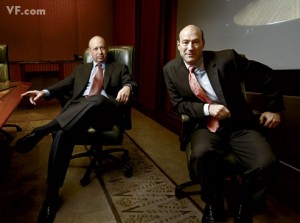 A friend of mine recently told me that a private equity firm was about to buy his family business. He was surprised when I advised against it. He explained his father wanted to retire with a nest egg from the sale. I asked, “Well what are you going to do for the rest of your life?” He said he was planning to continue working for the company.
A friend of mine recently told me that a private equity firm was about to buy his family business. He was surprised when I advised against it. He explained his father wanted to retire with a nest egg from the sale. I asked, “Well what are you going to do for the rest of your life?” He said he was planning to continue working for the company.
With tough love, I told him he had three years tops.
For the most part, private equity companies swoop down on companies with low debt, decent cash flow, and a lot of assets. They then issue tons of debt against those assets, collect millions in fees, and dump the debt-ridden company within a few years. Once saddled with debt, even the healthiest businesses struggle and often fail. Not bad for private equity companies – not good for employees.
I was tempted to send my friend Gretchen Morgenson’s article in today’s NYT about the downfall of mobile phone operator Wind Hellas after it was taken over by two private equity firms. One of the firms was Texas Pacific Group (TPG).
If you recall, TPG (along with Apollo Management) was the private equity group that bought out Harrah’s. Last month Harrah’s Chief Executive Gary Loveman said that the company might go public again, possibly by 2013. Of course in 2013, the company has $5.8 billion of its $19 billion of loans coming due. Harrah’s didn’t have most of this debt before the private equity companies bought them in January 2008. But hey, let the new shareholders worry about that.
If you’re looking for heart, the investment banks are no better than the private equity firms. Consider that in 2001, Goldman Sachs made $300 million in fees off Greece, selling the country derivatives that effectively hid the amount of debt the country was carrying. Goldman later made even more money selling credit default swaps to its customers, advising them to bet against Greece. Goldman claimed the country’s debt problems were bigger than people knew. Of course Goldman knew — the bank orchestrated the deal that helped Greece hide its indebtedness.
 Goldman was pretty good at the shell game. December 2008 was going to be a horrific month for the company; it was going drag down its fourth quarter earnings. So what did Goldman do? It changed its fiscal year — which effectively allowed it to omit December’s earnings (losses). Merrill Lynch also pulled the same stunt. December never happened. (Picture of Goldman’s CEO and COO from Vanity Fair – also nice article here.)
Goldman was pretty good at the shell game. December 2008 was going to be a horrific month for the company; it was going drag down its fourth quarter earnings. So what did Goldman do? It changed its fiscal year — which effectively allowed it to omit December’s earnings (losses). Merrill Lynch also pulled the same stunt. December never happened. (Picture of Goldman’s CEO and COO from Vanity Fair – also nice article here.)
Lehman Brothers pulled a slight variation of the shell game. During the bleakest quarters heading into the company’s ultimate demise, it executed some crazy off-balance sheet transactions (Repo 105) days before it would have to report — effectively hiding tens of billions of dollars in non-performing assets. After the reporting period, the company would reverse the transaction. A nice summary of Lehman’s shell game can be found here.
My managing editor at StreetAuthority was working on an article that was going to feature me. In it, he wrote about my frugality. Any one that knows me, knows I’m not wasteful when it comes to money. I remember when I first told Jen Leo I was taking the job with SA, her first response was, “Why are you getting a job? You never buy anything.”
It’s true that I have only ever bought used cars for cash — and then generally owned them for another ten years. I just can’t make myself spend a lot of money on a depreciating asset. I buy my jeans at second hand stores. It’s good for the local economy, the environment, and my pocket book. And I don’t fill up my gas tank unless I’m sure gasoline prices are about to rise. I watch the energy futures more closely than OPEC.
Recently, I had the control panel of my wall oven repaired, rather than spend three times as much on a new part (which was difficult to find in stock) or twelve times as much for a new oven. By the way, I totally recommend FixYourBoard.com. They not only replaced the broken elements in the control panel, they replaced known failure-prone elements and resoldered the entire board. They also guaranteed the part for two years — that’s twice as long as the manufacturer’s guarantee.
But contrary to Jen’s assertion, I do buy things I need or truly want. I bought a beautiful new Samsung refrigerator. Granted, my old refrigerator was 20 years old. And I did buy it during a 20% off sale. I also recently bought a Bose® SoundDock® Series II digital music system for iPod® – Silver. Although I did buy it on sale and also used an Amazon gift card.
 Yesterday, I paid $5/pound more for fresh caught salmon than for farm raised salmon. I also paid about $2/pound more for bison meat rather than buying ground beef. I did pass on the $21.99/pound goat cheese. But the cheese from the Pure Luck Farm and Dairy is well worth it. Two weeks ago when I was at Central Market, they didn’t have any of Pure Luck’s products on the shelves. There was only a sign that read, “We are feeding the kids right now. We’ll be back soon.” So I guess the new kids (pictured) are weaned — which means spring is here.
Yesterday, I paid $5/pound more for fresh caught salmon than for farm raised salmon. I also paid about $2/pound more for bison meat rather than buying ground beef. I did pass on the $21.99/pound goat cheese. But the cheese from the Pure Luck Farm and Dairy is well worth it. Two weeks ago when I was at Central Market, they didn’t have any of Pure Luck’s products on the shelves. There was only a sign that read, “We are feeding the kids right now. We’ll be back soon.” So I guess the new kids (pictured) are weaned — which means spring is here.
Apparently the boss nixed the article that mentioned my frugal ways. He told the editor my lifestyle might give people the impression I was something of “a loser.” Maybe he never read The Millionaire Next Door. I mean I know he is only watching out for me. Not everyone understands the frugal thing. But c’mon. All twelve of my Stock of the Month portfolio holdings – a real money portfolio funded by SA – are up. Some of them are up north of 40%. And my three closed positions all booked more than 50% annualized returns. Of course, I’ve been working with a particularly co-operative market. And every good poker player knows a good streak involves some level of luck.
Maybe I should be living a Bernie Madoff or Gordon Gekko lifestyle. Or maybe I should be playing some sophisticated shell game that bankrupts countries and companies. Maybe then, I wouldn’t be such a loser.
2 Comments